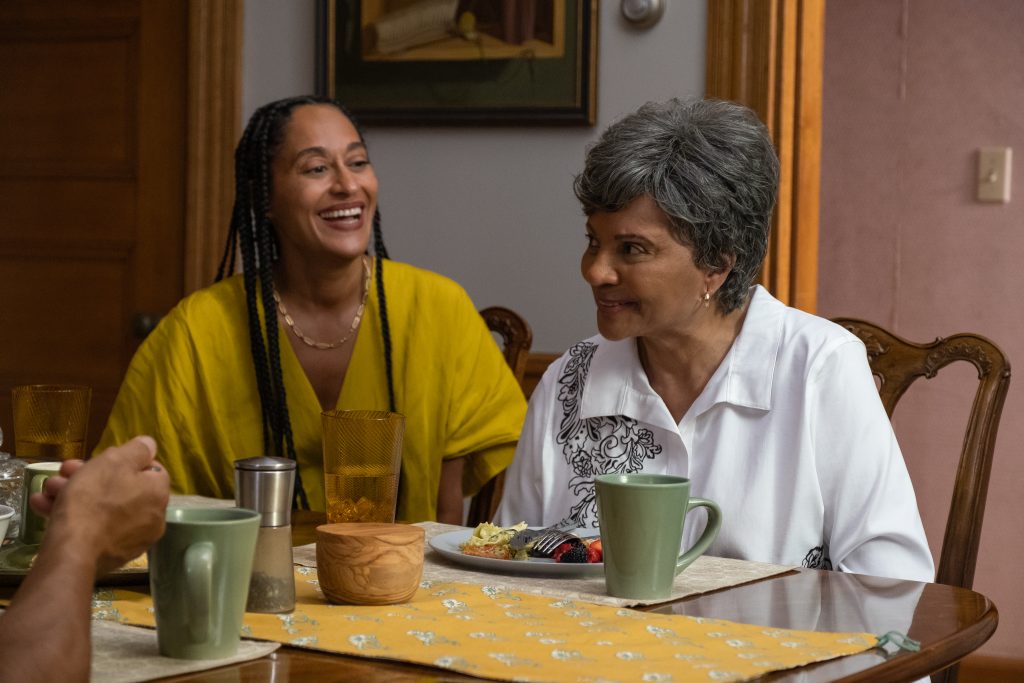‘American Fiction’: A Satire So Funny It Defies Every Stereotype

Brothers Cliff (Sterling K. Brown) and Monk (Jeffrey Wright) with friend Coraline (Erika Alexander) move mountains of family history in ‘American Fiction.’
There are some comedies that fall flat when you watch them alone. Woody Allen films come to mind; for some reason, they demand to be watched with a large audience, one that feeds on its own laughter. But Cord Jefferson’s directorial debut with American Fiction is a rare treat, a breakthrough comedy, because––for many reasons more––it’s laugh out loud funny, even without an audience. This is a comic masterpiece, best to be seen now before it joins the many streaming options. Seriously, go see it tonight!
Tropes and Truth
The film is a satire of stereotypes and one that’s not afraid to poke fun at itself. There’s little that’s “situational” about this comedy, but here’s the set-up. Thelonius “Monk” Ellison (Jeffrey Wright) is a single, aging Black college professor who writes deep, well-researched books on (well, we can only guess by their titles) Greek history or philosophy or, perhaps too apropos, cultural anthropology. Whatever it is he’s academically accredited to write is clearly erudite, intellectual and appeals to a very small audience. So small, in fact, his publisher has just canceled his latest book. While attending a writers conference in his hometown, Boston, he attends a “new author” Q&A with an Ivy-league educated Black writer (Issa Rae) whose debut novel is becoming a hot, best-seller. What appalls Monk is that this young woman has written about Black characters who only speak thick, poor Southern slang––a lot of “if’n y’all’s,” “I’s be afixin’ to’s,” and “I done aks’d da question, bitch” talk. The hot book delivers racist tropes in such poor taste Monk must ask himself, “Is there no honesty in literature anymore?”
Faith in Family

Lisa (Tracee Ellis Ross) and Mom (Leslie Uggams) share a rare laugh.
The truth is Monk has always held himself to a higher standard. We meet his recently-divorced sister, Lisa (Tracee Ellis Ross), who is a doctor at a women’s health clinic, the family’s long-time cook and joyous friend, Lorraine (Myra Lucretia Taylor,) and Mom (Leslie Uggams,) widowed and now challenged with early dementia. Dad was a family doctor, and there’s another son/brother, long estranged and recently divorced, Cliff (Sterling K. Brown). He’s a doctor, too. When Mom must be placed in an assisted care facility, the three children are challenged to cover the tab. But recent divorces and failed careers make that almost impossible. And, so, the Ellison family, as created by screenwriter/director Cord Jefferson, based on the 2021 novel “Erasure” by Percival Everett, is nothing unusual. And nor is it stereotypical.
Yet, that’s what this comedy is all about. To be purposefully brief, Monk comes to realize he must “rise above” by stooping low. Against all odds, he succeeds in writing typical American fiction that panders to a white audience’s expectation of the “true” Black experience. To say more would spoil everything. Yet, lest that premise seem shallow or sophomoric, few things make us laugh out loud more than recognizing an uncomfortable truth. And that truth––or at least, American Fiction’s truth––has a lot to say about white comfort, which, by means of this nearly perfect satire, has much to inform us about ignorance.
Delightfully Droll

American Fiction is a compendium of comic characters both Black and white. For example, we meet several writers who, along with Monk, are charged to judge the top prize in literary achievement for the year. The three white judges are, by turn: neurotic to a fault; so effete she can’t follow common rules; and, foolishly bombastic, like the village goat herder wearing spurs and a ten gallon hat. As Monk’s brother Cliff, Sterling K. Brown delivers a master class in playing the defeated prodigy who might not have been the family’s favorite had they known his little secret. And there’s Coraline, too, played beautifully by Erika Alexander, a neighbor who’s evidently a voracious reader of pop lit. Worry not that films about writing and reading tend to be dull—there’s nothing riveting about watching either activity––but here, there are love stories, wild parties, Hollywood hi-jinx, even a bloody shoot-out when least expected.
If Woody Allen ever exploited the neurosis of white Manhattan––if Spike Lee ever exposed the tempered rage of Brooklyn––then Cord Jefferson has done them both better. American Fiction deserves massive audiences, and, yet, it’s hysterical to watch as a party of one.
Photo credit: Claire Folger © 2023 Orion Releasing LLC. All Rights Reserved.
C. Prentiss Orr is a Pittsburgh-based writer who writes about theater and other topics for Entertainment Central.
Share on Social Media
Follow Entertainment Central
Latest Stories
Sign up for the EC Newsletter







